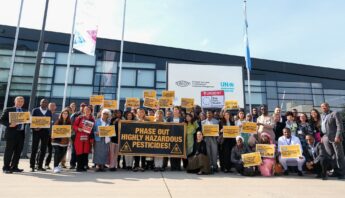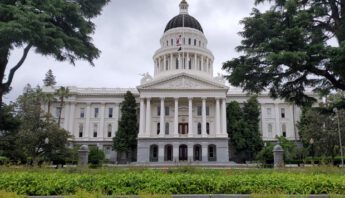PAN is motivated to do our work, in part, because we hear the stories of the people who are adversely impacted by our farm and food system that has been captured by corporate interests and made to rely on pesticides. These people are strong, competent individuals who seek to embrace the principles of agroecology and are working to build both their local and our global communities. Lorilani Keohokalole is undertaking a project to collect some of these stories from Hawaii that we will share with you over the coming months.
Today’s story is an interview with Andrea Brower. Andrea describes themselves as an activist-scholar, who is rooted in movements for justice, equality, liberation, and ecological regeneration. Their research and teaching expertise are in the areas of capitalism, colonialism, food, environment, the politics of the possible, and social movements. They are an Assistant Professor of Sociology with the Solidarity & Social Justice Program at Gonzaga University, living and working between Hawai’i and the Pacific Northwest. Their first book, Seeds of Occupation / Seeds of Possibility: The Agrochemical-GMO Industry in Hawaii, was published last year.

Andrea Brower and family
What does ALOHA ‘AINA mean to you?
As somebody who was born and raised in Hawaii because of settler colonialism, I recognize that concepts like aloha ‘aina do not belong to my ancestors. Because I grew up here, they are familiar to me upbringing but my knowledge is limited at best. As a settler, I can seek to understand such concepts and struggle alongside the indigenous communities who they originate from, but that is different from trying to appropriate or claim comprehensive knowledge.
What I have learned (and am still learning) about movements for aloha ‘aina is that the concept is about far more than the common translation “love for land.” It is also about resisting the things that have usurped Kanaka freedom to care for and love the land. Because land is inseparable from the people, community and culture, aloha ‘aina is also broadly a stand for Hawaiian self-determination.
Hawaiian activists and scholars have written about this extensively. Aloha ‘aina has a long history in anticolonial struggle and Kanaka rights to their land and the land’s protection. I think it’s essential for settlers to understand this, because it makes aloha ‘aina something more than light environmentalism. It forces us to reckon with the systems and forces that are actually destroying land and dispossessing people from their homelands.
What is the most important issue facing Hawai’i and our reliance on imported foods?
The dual forces of colonialism and capitalism (buttressed by white supremacy and heteropatriarchy) shape the social and ecological landscape in the islands, in entirely hierarchical, oppressive, destructive ways. They are the root causes of a plethora of issues. Some of these issues include housing that is absolutely unaffordable to locals, pesticide contamination, worker exploitation, and our highly vulnerable dependence on imported foods and other basic necessities. These are fundamentally connected, and it’s the root interlocking oppression that needs to be confronted, challenged, and changed if we are to overcome the incredibly unjust conditions found in Hawaii and our world.
More specific to the question, Hawaii’s dependence on imported foods is the result of the displacement of native food systems (which sustainably fed so many) through violent colonial theft. Hawaii was forced into dependence on a profit-driven, export-oriented capitalist plantation system, which generated immense wealth for very few white American (and a couple British) owners. As land, water, and people (labor) were devoted to the plantation economy, they were siphoned away from the regenerative regional food systems of Kanaka, and Hawaii was made dependent on imported foods.
Generally, imperial capitalism has remade the global food system into one that is designed to make profit for the already wealthy, not to feed people in any kind of equitable, healthy, sustainable, or culturally appropriate way. This is why the global food sovereignty movement connects challenging things like capitalist trade agreements or seed privatization to people’s rights to land, water, seed, and the means to grow food. If we are to fundamentally transform Hawaii’s food system into one that is primarily local, regenerative, fair, and healthy it will take some confrontation with big ag and the deeper forces that sustain it.
As someone that has lived in multiple cities on several different Continents, please share a few nuggets of wisdom that you have experienced that you believe Hawaii should adopt.
My first thought is that the structural forces bearing down upon Hawaii are global — so they are not entirely escapable anywhere. While our fights are often locally oriented, they are globally connected.
I always look for “nuggets of wisdom” in the local movements themselves, and there are many in Hawaii. The global food sovereignty movement (of which Hawaii is a part) is doing inspiring work connecting the dots between power, capitalism, colonialism / imperialism, racism, etc, and fighting for solutions that really get to the heart of these oppressive systems.
Do you have any examples of WINS that you see happening in Hawai’i happening right now?
The intersectional organizing that has been building in Hawaii is really inspiring and holds so much potential. Organizers and activists are forging broader coalitions across issues, and often really aiming to get more at the interconnected roots of all the issues. Ultimately, if we are going to address the fundamental causes of all the injustices we see in Hawaii (and globally), it is going to take system-oriented, intersectional, mass movements employing a variety of tactics.
The seeds for this kind of organizing are present in Hawaii. They are evident in things like the protection of Mauna Kea, the grassroots response to the Lahaina fires and food sovereignty and aloha ‘aina movements. The wins will grow as our movements do.
Other mana’o? (thoughts, ideas, beliefs)
I’m not sure if this is mana’o or not, but I have some observation.
We’re living through horrific, terrifying, violent times. It is really easy to become cynical and disengage or just want to hide! That’s what those in power would like for us to do. All of their mechanisms of propaganda try to convince us we are powerless. But human-made systems can be challenged and changed by humans.
The long history of humanity is one of tremendously beautiful capacities: altruism, deep concern for others, mutual-aid, reciprocity with the wider web of life, AND the desire and ABILITY to resist oppression. We need to always be reminding ourselves of these facts when times are dark, because history is never a foregone conclusion. History is always a question in the making. And while those of us that are alive today have been born into a moment of tremendous hierarchy, violence, oppression, and destruction of our earth home, there is always a chance of creating a loving world that the vast majority of us long so deeply for.







